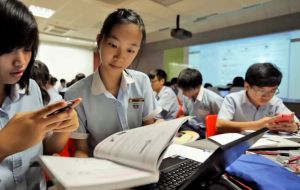MercoPress. South Atlantic News Agency
World Bank unveils “Human Capital Index”: Singapore, South Korea, Japan and Hong Kong top of the list
 World Bank Group President Jim Yong Kim said he hoped the new index would encourage governments to take steps aimed at moving up the rankings
World Bank Group President Jim Yong Kim said he hoped the new index would encourage governments to take steps aimed at moving up the rankings  The index measures a country’s educational achievement based on the years of schooling a child can expect to obtain by age 18
The index measures a country’s educational achievement based on the years of schooling a child can expect to obtain by age 18 The World Bank Group unveiled a new system on Thursday to rank countries based on their success in developing human capital, an effort to prod governments to invest more effectively in education and healthcare.
The bank’s “Human Capital Index,” showed poor African countries fared the worst in the rankings, with Chad and South Sudan taking the two lowest spots, while Singapore topped the list, followed by South Korea, Japan and Hong Kong.
The rankings, based on health, education and survivability measures, assess the future productivity and earnings potential for citizens of 157 of the World Bank’s member nations, and ultimately those countries’ potential economic growth.
The index was unveiled at the World Bank and International Monetary Fund annual meetings on the Indonesian island of Bali.
It found that on average 56% of children born today will forego more than half their potential lifetime earnings because governments were not investing adequately to ensure their people are healthy, educated and ready for an evolving workplace.
World Bank Group President Jim Yong Kim said he hoped the new index would encourage governments to take steps aimed at moving up the rankings, much as they seek to with the bank’s popular “Doing Business” survey, which ranks countries based on ease of doing business, with low-tax, low regulation economies faring better.
Kim acknowledged that the rankings would be controversial, but told reporters that the need for more and better investment in people was “such that we couldn’t shy away from making leaders uncomfortable”.
The index measures the mortality rate for children under five, early childhood stunting rates due to malnutrition and other factors, and health outcomes based on the proportion of 15-year-olds who survive until age 60. It measures a country’s educational achievement based on the years of schooling a child can expect to obtain by age 18, combined with a country’s relative performance on international student achievement tests.
In top-ranked Singapore, the earnings potential was 88% of potential, while in the United States, ranked 24th between Israel and Macau, productivity and earnings were measured at 76% of potential.




Top Comments
Disclaimer & comment rulesCommenting for this story is now closed.
If you have a Facebook account, become a fan and comment on our Facebook Page!